
Decentralized YouTube alternatives are shaking up the online world. However, In an era where digital content is king and video is the crown jewel, YouTube reigns supreme. Don’t lose faith just yet. Beneath the surface of this digital monarchy, a revolution is brewing.
A new breed of video streaming platforms is emerging, challenging YouTube’s dominion with a decentralized approach.
Powered by blockchain technology, these platforms are not only transforming the way we consume video content, but also how we interact with it. They promise greater control, enhanced privacy, and fairer rewards and monetization opportunities for content creators.
Sponsored
Are decentralized YouTube alternatives truly up to the Herculean task? In a battle of David vs. Goliath, can heavyweight media platforms like YouTube ever be overthrown?
Table of contents
What Are Decentralized Video Platforms?
Decentralized video platforms are exciting new video streaming services that harness blockchain technology to disrupt the traditional, centralized video hosting and content sharing model.
Unlike video-sharing platforms like YouTube, where all content is stored on a single company’s servers, decentralized platforms distribute the storage and streaming of content across multiple nodes in a peer-to-peer network.
Sponsored
This decentralization brings about a host of benefits. It reduces the risk of censorship, as no single entity controls all the content. It also enhances privacy, as user data isn’t concentrated in one place. If that wasn’t enough, it allows for innovative monetization strategies, often involving cryptocurrencies, that can provide content creators a fairer share of revenue.
Why Do We Need Decentralized Video Streaming Platforms?
Where to begin? As you can probably imagine, centralized platforms have full control over the content they host. Social network giants like YouTube decide what content is allowed, how it’s promoted, and who gets to see it.
This leads to issues of censorship, bias, and lack of transparency. On the other hand, decentralized platforms distribute control among users, reducing the risk of censorship and promoting a more diverse and open content ecosystem.
But YouTube isn’t the only player at fault here. Centralized video and streaming platforms like Vimeo and Twitch also often collect vast amounts of user data, which they package and sell to advertisers. This inevitably raises concerns about privacy and data security. Decentralized platforms, by contrast, can offer enhanced privacy by design, as user data isn’t concentrated in a single location.
Finally, the revenue models of centralized platforms often favor the platform itself rather than content creators. Even trending content creators find it difficult to earn a sustainable income, despite having a significant audience.
Decentralized platforms often provide creative alternative monetization strategies. These models are usually backed by crypto economies and powered by automated smart contracts, helping streamers and creators trace their revenue flow in real-time.
Best Decentralized YouTube Alternatives For Video Content
As the digital landscape evolves, several decentralized platforms are rising to the challenge, offering compelling alternatives to YouTube. Without further, here are our top seven decentralized YouTube alternatives.
1. Dtube
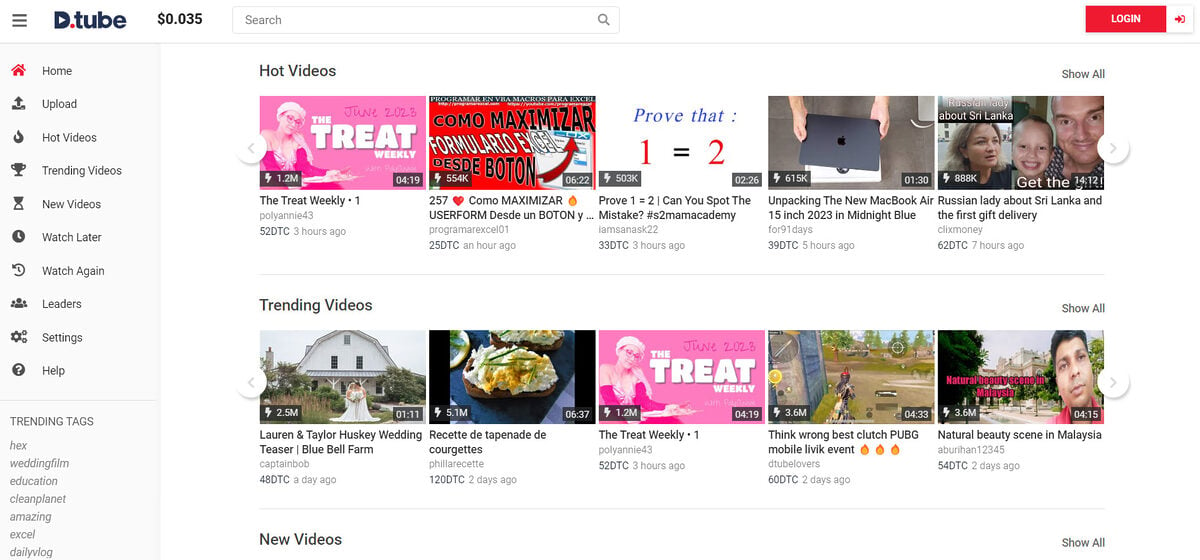
DTube stands as a shining beacon in the realm of decentralized YouTube alternatives. It’s a crypto-based video platform built on the STEEM blockchain and the IPFS (Interplanetary File System) peer-to-peer network. It offers a unique blend of technology and user-focused features.
DTube offers a state-of-the-art video streaming service where users can discover, upload, and share a wide variety of content. It’s designed to be censorship-resistant, providing a platform where freedom of expression is valued and protected.
Key Takeaways:
- DTube offers a comprehensive video streaming service, allowing users to discover, upload, and share a wide variety of content.
- The platform is designed to be censorship-resistant, providing a safe haven for freedom of expression.
- DTube does not rely on hidden algorithms for content promotion. Instead, all service-related data is publicly available, ensuring a fair and transparent user experience.
2. LBRY
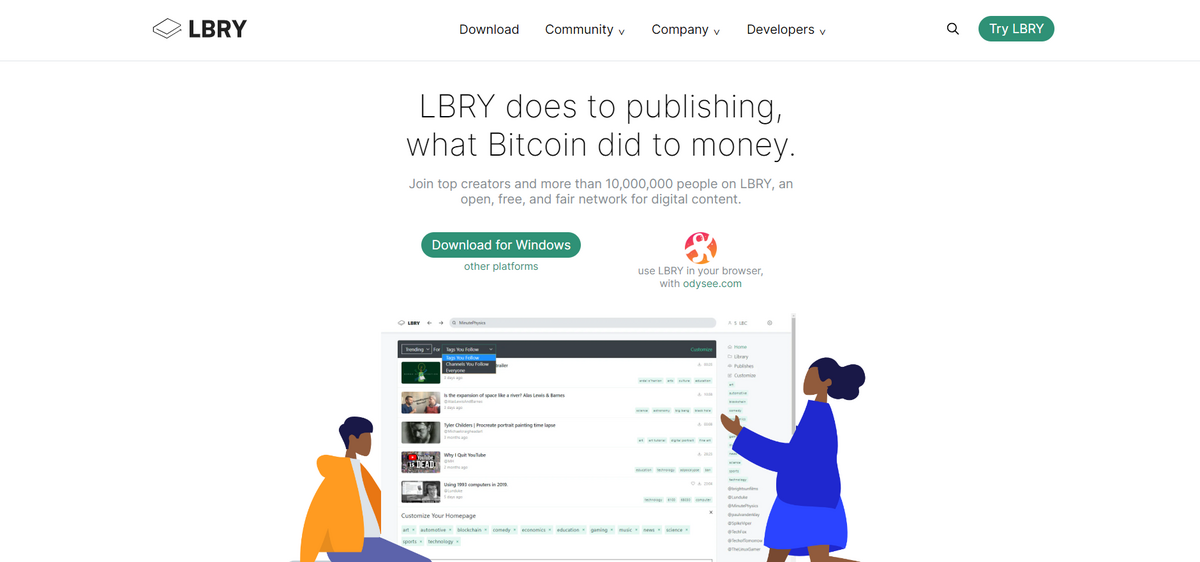
LBRY is an open-source digital content-sharing platform that is rapidly gaining popularity. It’s more than just a video-sharing service; it’s a marketplace for all types of digital content, from movies and music to games and books.
The platform offers users a range of options for creating, sharing, uploading, downloading, and purchasing content. It also rewards users with its own cryptocurrency, LBRY Credits (LBC), for various activities on the platform.
Key Takeaways:
- LBRY is an open-source digital content-sharing platform that supports various content types, from videos and music to games and books.
- It offers a range of content management tools for creating, sharing, and purchasing content.
- LBRY has its own cryptocurrency, LBRY Credits (LBC), which users can earn through various activities on the platform.
- The ad-free platform offers users a smooth and uninterrupted content viewing experience.
3. Theta
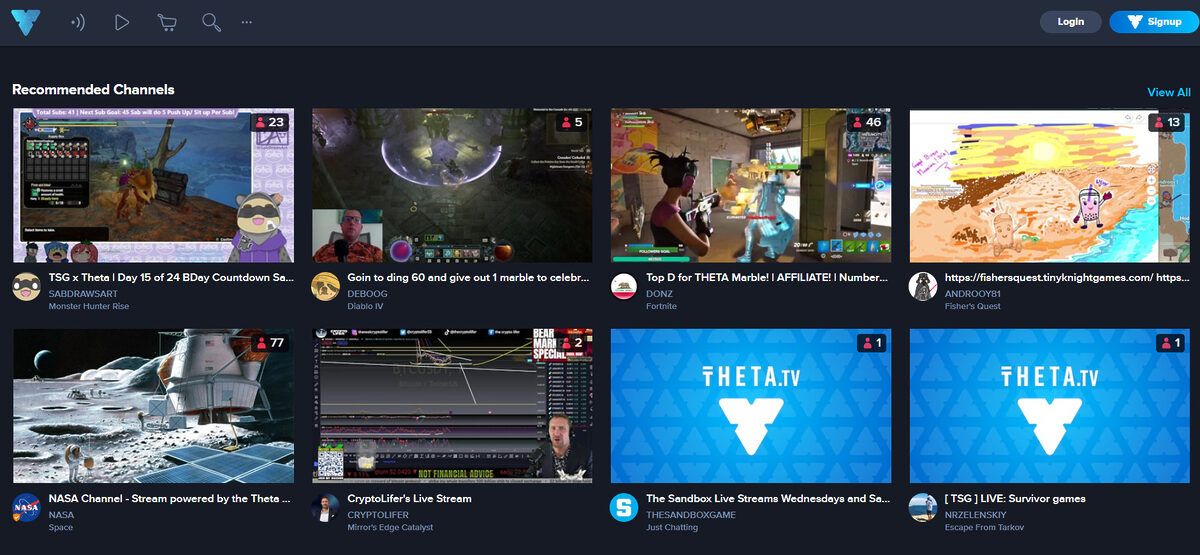
Theta is a decentralized YouTube alternative powered by blockchain technology. It aims to provide high-quality video content at a fraction of the cost, making it a promising choice over traditional video streaming platforms.
The platform operates on a unique model where users share excess bandwidth and computing resources, earning Theta tokens in return. What’s interesting about Theta is that the platform is mainly used by gaming and NFT enthusiasts, making it a popular option with niche pockets of the crypto community.
Key Takeaways:
- Theta is a decentralized video delivery network that provides high-quality video content at a lower cost.
- The platform operates on a unique peer-to-peer infrastructure where users share excess bandwidth and computing resources.
- Users can earn Theta tokens by sharing their resources, creating a mutually-beneficial ecosystem for both viewers and content creators.
- Popular amongst gamers and NFT enthusiasts.
4. DLive
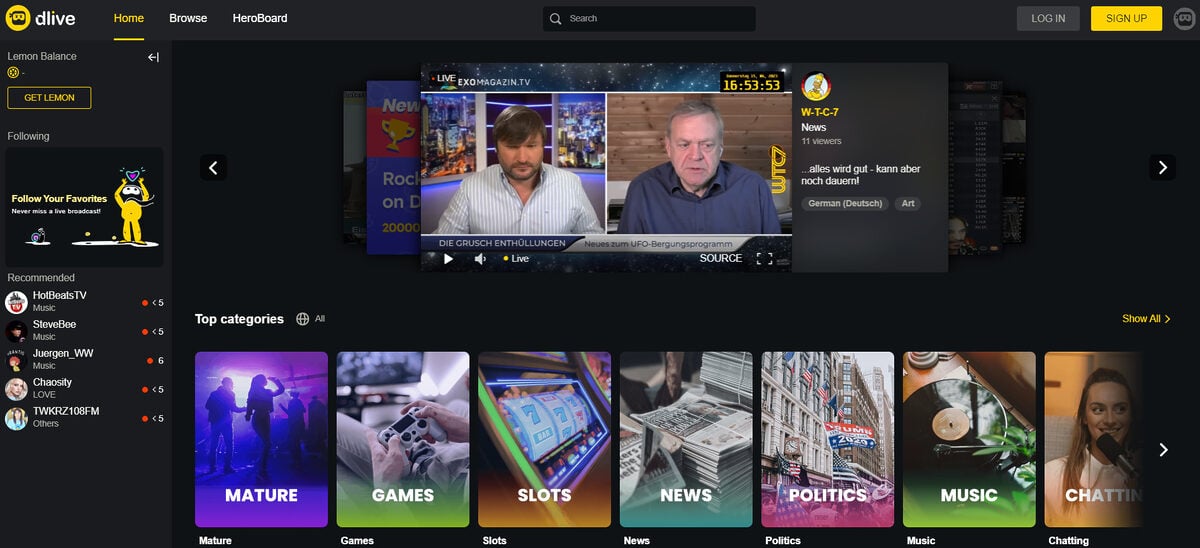
DLive is a unique player in the decentralized video streaming landscape, focusing primarily on live-streaming functions. Built on the Lino blockchain, its dedicated network, DLive promises to return streaming value to content creators and viewers.
The platform ensures that content creators and viewers are rewarded for their contributions. It uses its own tokens, LINO, for transactions, donations, and subscriptions, providing a unique monetization model that benefits the entire community.
Key Takeaways:
- DLive is a blockchain-based platform focusing on live-streaming functions, providing a unique niche in the decentralized video streaming landscape.
- The platform returns streaming value back to content creators and viewers, offering a fairer revenue model than traditional platforms.
- DLive uses its own tokens, LINO, for transactions, donations, and subscriptions.
5. 3Speak
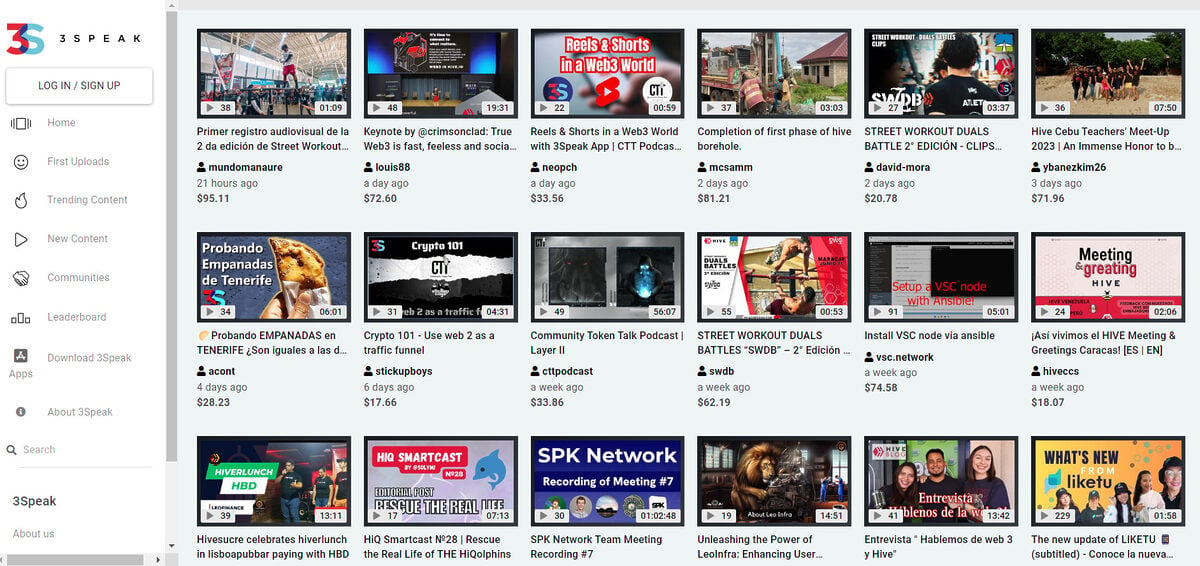
3Speak is a decentralized YouTube alternative that operates on the Hive network. It’s designed to empower content creators by giving them true ownership of their digital assets. 3Speak also functions as a kind of censorship-resistant social media network, where users are encouraged to speak their minds.
The platform rewards users and content providers with HIVE tokens, providing a unique monetization model. It also offers video viewing, live streaming, podcasts, cryptocurrency transactions, and a platform for citizen journalists, making it a comprehensive solution for content creators and viewers alike.
Key Takeaways:
- Built on the Hive network, 3Speak provides a decentralized video platform for emerging content creators.
- The platform rewards users with HIVE tokens, providing a unique and rewarding monetization model.
- 3Speak offers a range of features, including videos, live streaming, podcasts, rewards, and cryptocurrency transactions.
- It also provides a platform for citizen journalists, promoting free speech and diverse content.
6. Livepeer
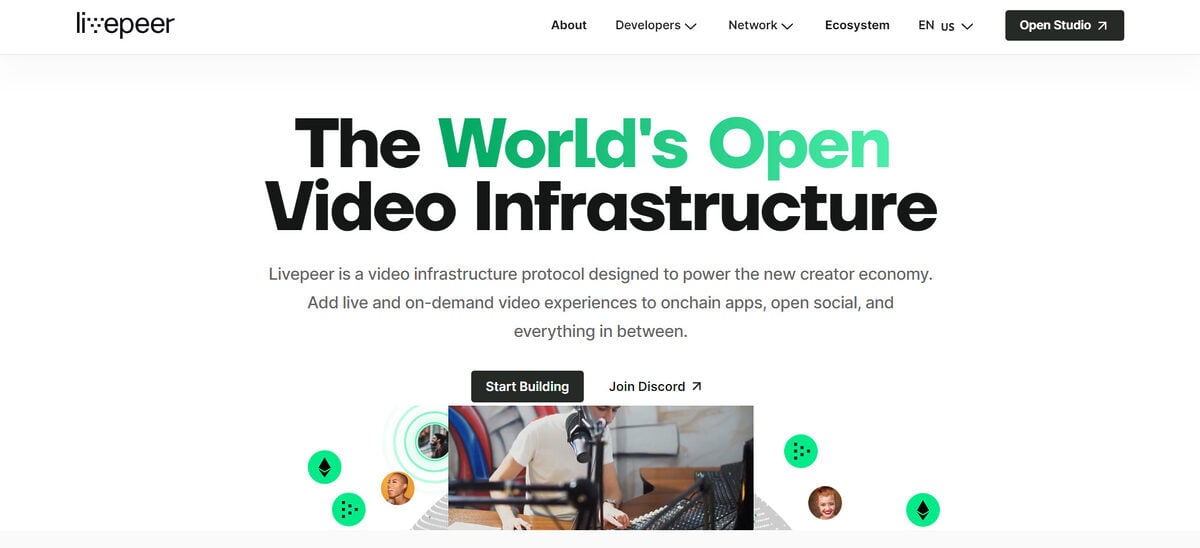
Ethereum fans, rejoice! Livepeer is for you. This decentralized video streaming platform is hosted on the Ethereum (ETH) network. It aims to provide video creators with affordable and efficient live-streaming services.
The platform operates on a unique model where users and broadcasters send streams through the platform, which converts them to every available format to suit viewers. It’s an open-source network that eliminates censorship, giving users freedom of speech in their content.
Key Takeaways:
- Livepeer is a decentralized video streaming platform built on the Ethereum blockchain.
- Livepeer is an open-source network that eliminates censorship, promoting freedom of speech and diverse content.
- Users trade processing power and unused transmission capacity in exchange for crypto tokens.
7. Flixxo
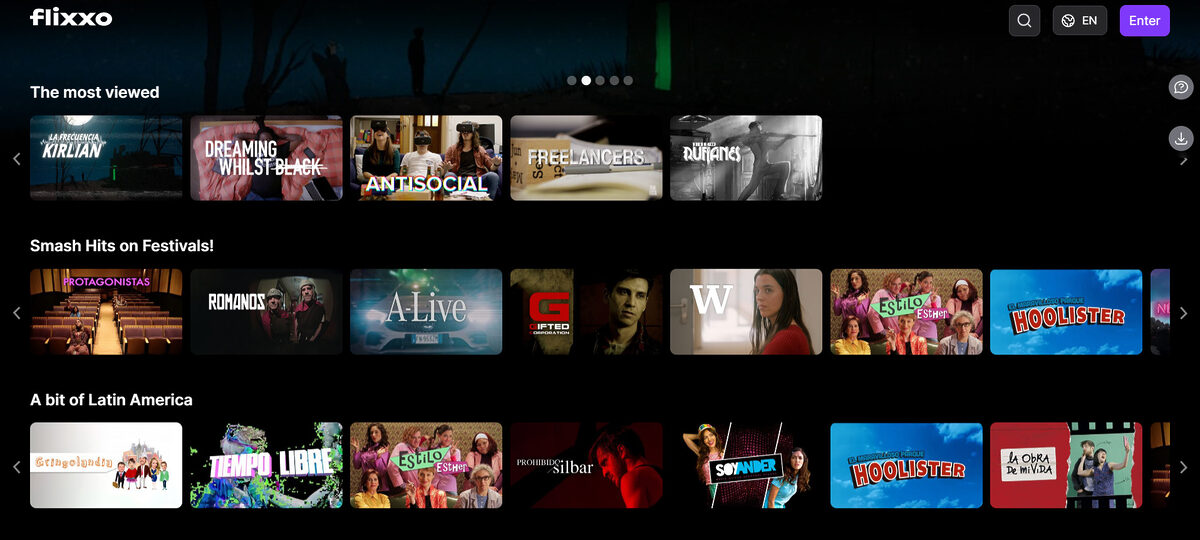
If you’ve ever used Netflix before (let’s be honest, everyone has) Flixxo’s UI will already be familiar to you. Flixxo is a decentralized video distribution network that combines blockchain technology with BitTorrent’s peer-to-peer file-sharing protocol.
It aims to create a decentralized network where content creators can share their work and earn rewards through FLIXX tokens.
The platform operates on a unique model where users earn tokens by watching ads and can spend these tokens to consume content, creating a balanced cryptocurrency economy. There’s an added social layer where users can interact, like, and share content, fostering a vibrant community.
Key Takeaways:
- Flixxo combines blockchain technology with BitTorrent’s peer-to-peer file-sharing protocol.
- The platform operates on a unique model where users earn tokens by watching ads.
- Flixxo offers a social layer where users can network with like-minded people.
Decentralized YouTube Alternatives Pros & Cons
Decentralized YouTube alternatives offer a new and innovative approach to video streaming, but like all technologies, they come with their own set of pros and cons.
Pros
- Censorship Resistance – Decentralized platforms distribute control among users, reducing the risk of censorship and promoting a more diverse range of content.
- Enhanced Privacy – User data isn’t concentrated in a single location, offering enhanced privacy by design.
- Monetization Opportunities – Decentralized video platforms offer alternative monetization strategies, often involving cryptocurrencies, that provide a fairer share of revenue to creators.
- Community Control – Decentralized platforms often allow the community to have a say in the platform’s rules and policies, leading to more user-friendly environments.
Cons
- Adoption Rate – Decentralized platforms struggle with user adoption. Many people are still unfamiliar with blockchain technology and may be hesitant to switch from familiar, trusted platforms like YouTube.
- Censorship Resistance – That’s right, free speech is both a blessing and a curse. Without a degree of censorship, these video platforms risk being overrun with spam and hateful or inappropriate content.
On the Flipside
- The majority of the internet likes YouTube. It has a simple, easy interface and a trusted name. Most people aren’t actively looking for an alternative, meaning that decentralized platforms struggle to siphon YouTube’s market share and dominance.
Why This Matters
With so many decentralized Youtube alternatives out there, it’s hard to know which are providing a quality service worth using. This guide aims narrow your search, and help you find a decentralized video platform that suits your needs.
FAQs
DTube is a decentralized video platform with no central authority or governing body. DTube is governed by its own community of users.
Plenty of decentralized YouTube alternatives are available on the internet, including Dtube, LBRY, Theta and 3Speak.
On decentralized YouTube alternatives, the platform is owned and governed by its users. These platforms are often backed by crypto economies that reward user engagement and interaction.
